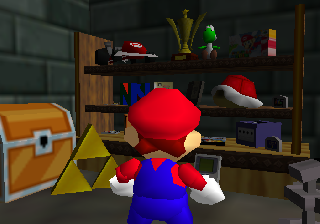

Tyler Kehne is another influential member of the inner circle of Mario TASers. Scott's tool-assisted runs can frequently take him up to 12 hours to complete a single movement-often just to save a single 'A' press. If something doesn't work I'll keep trying it and keep thinking about new possibilities." That patience goes well beyond running into walls when trying to figure out a new method. When I asked Scott what he felt he brought to the group, he was quick to answer: "I'm creative in coming up with new strategies and I have a lot of patience. "Each one of us has a really good strength that no one else has, so it's really helpful that we're all together and can communicate so easily," he said. This incredible reduction of presses is thanks to Scott and the Facebook group of 12 other Mario 64 'TASers' he collaborates with. He's even working on a " no button challenge" to beat the game using only the joystick. Thanks to Scott and his peers, the 'A' button challenge has been reduced from 118 presses down to 32 for the 100% run. Scott's main focus now is the ''A' button challenge', a bid to figure out the optimal way of beating Super Mario 64 both by collecting all 120 stars (called a 100% run) or going straight for the finish line (called an any% run). In 2014, for example, Scott collected a coin that players had known about for 12 years but been unable to reach by exploiting geometry in the world. But not content to be just scribes, they use their masterful knowledge of these glitches to do incredible things.

He works with a team of 12 other players who have transformed Super Mario 64 from a game into a science. Today, Scott is one of the more popular tool-assisted runners in the entire community. Excited by this new discovery, Scott made his first YouTube video to share his findings with the world and took his first steps into the community of tool-assisted play. Adamant that he would now beat the challenge his childhood self had failed to master, Scott discovered something interesting: It wasn't just three levels that Mario could gather infinite coins on but many more.

It wasn't until several years later, as a teenager, that Scott rediscovered his love of Super Mario 64 thanks to an emulator he downloaded onto his computer. But being just a kid wrestling with the N64's awkward controller, Scott found he lacked the dexterity for these greater challenges and eventually drifted away from the game. Through the website, he even discovered there were three different levels that, with careful use of a glitch, a player could potentially gather infinite coins. Using, Scott's "bible" for the game, he began seeking greater challenges, like collecting every coin on every level. But unlike most of us, once Scott had finally mastered every challenge Super Mario 64 offered, he wasn't ready to move on. As a child, it was the first game he ever played. "I've been playing Mario since before I can remember," Scott told me one afternoon as we chatted over Skype. His staggering understanding of the game's programming and the glitches it spawns allows him to combine both to fascinating effect. He can control Mario frame by frame, maneuvering him in ways even the average speed runner only dreams of doing. By using emulators and memory hacking software, Scott is able to play Mario at a level that is impossible by traditional means. It's a game that he has mastered both inside and out, and his knowledge of its inner clockwork borders on academic. But for Scott "pannenkoek2012" Buchanan, Super Mario 64 has no end. It's an exploration of the inner-life of video games, and it takes teams of expert players and programmers thousands of hours to do.įor many of us, a video game ends when the credits roll or when every challenge has been mastered-if we even make it that far.

Tool-assisted speedrunning ('TAS') might seem like simple cheating, but it's so much more than that. But there's another side to the coin that isn't nearly as popular as traditional speedrunning, a niche community of players prying open games and doing the unimaginable. If you watched this year's Awesome Games Done Quick, you're already familiar with the Olympian feats of endurance and skill that players exhibit as they race through your favorite games and make you realize that, no, you aren't nearly as good at them as you might have thought.


 0 kommentar(er)
0 kommentar(er)
